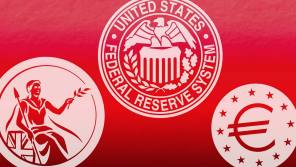

The current boom in eurozone shares is a sign the market is becoming too optimistic about the bloc's prospects, according to the chief economist of Invesco Perpetual.
The MSCI Europe Index had a torrid 2016, returning 0.22 per cent, compared with more than 8 per cent for the MSCI All Country World Index.
But in 2017 the Europe Index has outperformed, returning 23 per cent compared with 18 per cent for the global index.
John Greenwood said the economic data emerging from the eurozone has been “gradually improving” but he drew comparisons with the sharp rise in certain US equities after the election of Donald Trump as US president, when the market rallied in expectation of political change only for the politics not to happen as the market expected.
He said the economic data showed that while credit growth, a key measure of future GDP growth, has been improving, it is currently at a level that implies GDP growth of less than 2 per cent a year in the coming years.
Mr Greenwood said inflation could fall further, and monetary policy errors by the European Central Bank delayed the economic recovery.
As the bond buying programme ends, Mr Greenwood said this risks pushing inflation down further.
Bruce Stout, who runs the £1.4bn Murray International investment trust remains scathing of the outlook for global developed markets and the role of global central bank policy in pushing asset prices upwards.
Mr Stout said: “For those prepared to scratch below the now crumbling veneer of economic respectability as presented in the developed world, its becoming increasingly evident that monetary policy incompetence over the past decade has created deeper structural problems than those it intended to alleviate.
"Excessive debt, excess capacity and evaporating confidence threaten to escalate deepening deflationary pressures, an environment not conducive to current euphorically priced equity markets. Against this backdrop, great caution is warranted.”
Analysts at the Economist Intelligence Unit said the eurozone unemployment rate remains high and the next stage of economic growth in the bloc will come when the jobless rate falls.
Minesh Patel, financial planner at EAF Solutions, said he has been increasing his eurozone exposure but tends to focus on the German market, as that is where the bulk of the equity market is located.
david.thorpe@ft.com



